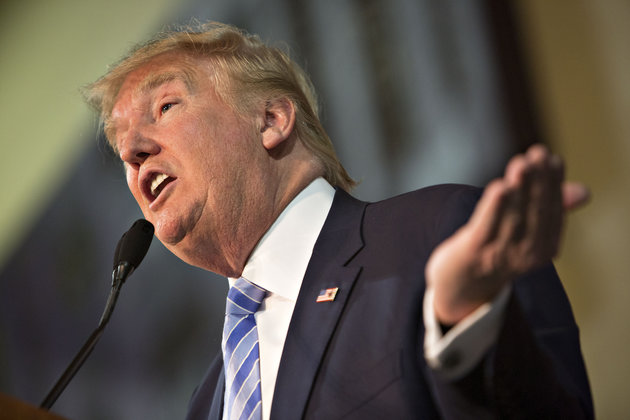
Donald Trump has jumped into the debate over prescription drug prices -- and, if reports are correct, he’s standing in the same place as Hillary Clinton, Bernie Sanders and President Barack Obama.
According to The Associated Press, Trump told a New Hampshire audience on Monday night that he thinks Americans are paying way too much for their prescription drugs. To remedy this, the Republican presidential front-runner said, he would have the federal government negotiate directly with pharmaceutical companies to obtain lower prices. Doing so, Trump reportedly said, could enable the U.S. to “save $300 billion” a year.
The Trump campaign has not distributed official material to support this statement and has not responded to inquiries from The Huffington Post. That makes it impossible to know precisely what the candidate has in mind or how he came up with the $300 billion figure, which is actually slightly more than total U.S. spending on outpatient drugs as of 2014.
Trump could be calling for the government to bargain with drugmakers over the price of pharmaceuticals that seniors obtain through Medicare Part D. It’s also possible, although less likely, that he could have something far more ambitious in mind, like having the government negotiate the price for all drugs sold in the U.S.
And of course, it’s possible Trump was speaking off-script, without much attention to detail. It wouldn't be the first time.
But if the reports are right and Trump sticks with his position, he'd be squarely on the Democratic side of a debate that has divided the two parties for at least 20 years. Americans today pay far more for drugs than people living overseas because the governments of other countries deal directly with drug companies and set prices as part of their national health systems.
This is true of routine prescriptions, like the medications that tens of millions of Americans take for allergies or acid reflux, and it’s true of more exotic drugs as well. One stark example is Gleevec, a leukemia treatment that costs Americans an average of $6,214 per regimen, according to the International Federation of Health Plans. The same drug costs the Swiss national health system just $3,363. The price for Canada’s government health system is just $1,141.
Democrats have long insisted that the U.S. government should have similar power over drug companies. Democratic presidential candidate Hillary Clinton issued such a call in 2008 and has done so again this year. Her rival, Sen. Bernie Sanders (I-Vt.) has said enabling the government to set drug prices is part of his proposal to create a “single-payer” insurance system. Obama has also called for government negotiation of prices.
Republicans and their allies have traditionally opposed such measures, arguing that cutting into drug companies' profits would reduce innovation. They have also argued that the government could not negotiate successfully with drug companies unless it was willing to walk away from negotiations and deny insurance coverage for certain drugs.
Advocates for government drug pricing rarely acknowledge that last point -- which, the GOP and conservatives say, could mean people lose access to medications they want or need.
On Tuesday, a spokesman for Sen. Ted Cruz (R-Texas), Trump’s chief rival for the GOP nomination, said he was not surprised to see Trump defy conservative orthodoxy since the business mogul expressed support for a single-payer system in 1999 and has spoken admiringly of such systems since then. Trump has, however, recently disavowed intentions to create such a system here.
“Trump has already promised that he will support a single-payer healthcare system, so it is not surprising that he thinks the government can set pricing for drugs,” Rick Tyler, a Cruz spokesman, told HuffPost. “The problem is that when government interferes in the market, and especially the healthcare market, the result is always the same: high prices, lower quality, less choice and fewer innovations, and it will cost lives.”
Yet the experience abroad -- and for certain U.S. organizations like the Veterans Health Administration, which has long obtained discounts using a similar mechanism -- suggests that patients don’t suffer when the government negotiates drug prices.
There’s no question that Trump is seizing on a popular position. In an August 2015 poll by the Henry J. Kaiser Family Foundation, 83 percent of respondents said they favored having the government negotiate drug prices for Medicare. Even among respondents who identified themselves as Republican, support was high: 74 percent.
Of course, the primary political obstacle to giving the government control over drug prices has been the lobbying power of the drug industry -- something Trump was sure to point out on Monday. “We don’t do it,” Trump said. “Why? Because of the drug companies.”
- Publish my comments...
- 0 Comments
